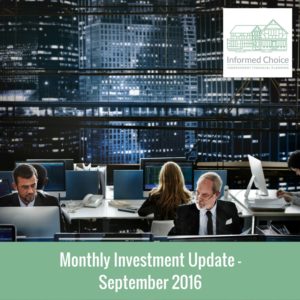 In our latest monthly investment update for September 2016, we look at how the investment markets, global economy and commodity prices are performing.
In our latest monthly investment update for September 2016, we look at how the investment markets, global economy and commodity prices are performing.
The FTSE 100 index of leading UK company shares finished August at 6,781.51 points, up by 60.45 points or 0.9% during the month.
Markets finished the month on a slightly cautious note ahead of the release of the latest US jobs figures. These are expected to show new jobs being added across the US in line with expectations, but slightly down on last month.
In the UK, manufacturing activity recovered sharply during August, according to the Markit/CIPS purchasing managers’ index (PMI).
The index rose to 53.3 in August from 48.3 in July, with a figure above 50 indicating the manufacturing sector is expanding. The survey also suggested that a weaker pound is pushing up the costs faced by manufacturing companies.
Recruiter Hays has claimed the UK jobs market has weakened ‘significantly’ around the time of June’s EU referendum.
The comments came as the business reported an 11% rise in pre-tax profits, which were largely driven by strong trading in Asia and the rest of Europe. They said net fees from recruitment were flat towards the end of its financial year, which coincided with the build-up to the EU referendum.
British house prices rose in August, despite June’s referendum result. According to the Nationwide House Price Index, average prices were up by 5.6% compared with the same month last year, compared to annualised growth of 5.2% in July.
In monthly terms, house prices rose by 0.6%, from a rise of 0.5% in July. The average house price now stands at £206,145. Nationwide did however comment that the outlook for house prices remains clouded.
Price Inflation in the eurozone stayed at 0.2% for the year to August. This was despite the European Central Bank easing monetary policy with the aim of pushing up price inflation towards its target of 2%. As a result, many economists believe the ECB will need to further lower interest rates and stimulate economic growth.
Emerging market economies including India and some countries in South East Asia are experiencing steady economic growth.
Indonesia’s economy, which is the largest in the region, grew by 5.2% in the second quarter. This represented the fastest year-on-year expansion for ten quarters.
The Philippines also delivered a better than expected economic performance, growing by 7% in the second quarter. India, the world’s seventh largest economy, grew by 7.9% in the first quarter.
As well as reaffirming Asia’s status as the fastest growing region in the world, the figures suggest emerging market economies will continue to outgrow developed economies.
Oil prices rose in August, but fell sharply at the end of the month after US government data showed a larger-than-expected weekly build in US crude and distillate stockpiles and a smaller-than-expected drawdown in gasoline.
A rallying US dollar and expectations for an OPEC-led production freeze failing to materialise have also contributed to a weak oil price. Brent Crude Oil Futures are at $46.66 a barrel at the start of September.
The benchmark 10 year UK Gilt yield stands at 0.69% at the start of September; up slightly during the past month but remaining very low as investors continue to seek a safe haven for their money.
£1 buys $ 1.32490 or € 1.18900. The Forex Gold Index is $1,309.25/oz and the Silver Index is $18.74/oz.

